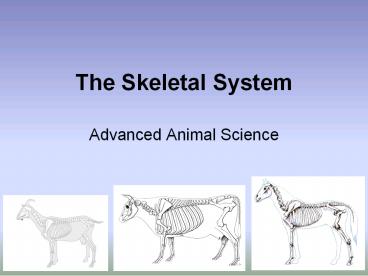The Skeletal System - PowerPoint PPT Presentation
1 / 17
Title:
The Skeletal System
Description:
Title: Unit 3, Lesson 1: Skeletal System Author: ffa Last modified by: kwell Created Date: 6/14/2005 9:59:30 PM Document presentation format: On-screen Show (4:3) – PowerPoint PPT presentation
Number of Views:55
Avg rating:3.0/5.0
Title: The Skeletal System
1
The Skeletal System
- Advanced Animal Science
2
What is the purpose of a skeletal system?
- Provides the frame and support for all the other
systems and organs - Aids in movement
- Provides protection
- Site of mineral storage
- Site of blood cell formation
- Made up of bones,
- cartilage, and
- connective tissue
3
What is bone made of?
- Bone is comprised of
- 26 minerals (mostly calcium phosphate and
calcium carbonate) - 50 is water
- 4 is fat
- 20 is protein
- Bone requires adequate
- amounts of vitamins and
- minerals in the ration.
4
Types of bones in the animal body
- Long Bones
- Serve as support columns
- Provide support for the body giving it the
rigidity (hardness) necessary to stand and move - Example Leg Bones
5
Types of bones in the animal body
- Short Bones
- Shaped like a cube
- Often as big around as they are long
- Located in complex joints, such as the knee and
hock - Serve as hinges
- Protect long bones
- by being flexible
- Cushion shock
- Diminish friction
- Example Hock, Knee
6
Types of bones in the animal body
- Flat Bones
- Relatively thin and flat and usually curved
- Protect vital organs such as the brain, the
heart, and the lungs - Are longer and wider than they are thick
- Usually multiple bones fused together
- Example Scapula, Skull, Ribs
7
Types of bones in the animal body
- Pneumatic bones
- Contain air spaces called sinuses that are in
contact with the atmosphere. - Example Frontal face bones.
A) Cattle, B) Hornbill, C) Turkey
8
Types of bones in the animal body
- Irregular Bones
- Irregularly shaped
- Important to the protection and support of the
central nervous system - Points of some muscle attachment
- Example Vertebrae
These bones make up the backbone, which is not a
single bone, but a series of irregular bones.
They flex and bend to give the animal movement.
The vertebrae are divided into several different
areas Cervical, Thoracic, Lumbar, Sacral, and
Coccygeal.
9
Types of bones in the animal body
- Irregular Bones
- Cervical Vertebrae-The section in the neck from
the skull to the first rib. - Thoracic-extends along the rib cage. Each of
these has a rib attached to each side. - For Your Information Cattle have 13, Horses have
18, and Pigs have 13-14 dependent on breed. - Lumbar-The area of the spinal column from the
last rib to the pelvis. Also referred to as the
loin.
10
Types of bones in the animal body
- Irregular Bones
- Sacral-Extends through the pelvic area. The bones
in this region are fused together to form a rigid
section called the sacrum-providing an attachment
for the pelvis. - Coccygeal-The vertebrae that continue from the
pelvis to the end of the tail. - For Your Information The bones at the top of the
tail are larger than the bones at the end. The
size tapers until the ones at the end have no
channel.
11
Types of bones in the animal body
- Sesamoid Bones
- Flat and round
- Located along the course of tendons.
- Example Kneecap or patella
12
Dissecting the Skeleton
- Skeletons can be divided into two sections, which
include - Axial SkeletonThese bones are on or close to the
midline axis of the body and include the skull,
vertebrae, ribs, sternum, pelvis, and tail. - b. Appendicular skeletonThese bones project
from the body in the thoracic (front) and pelvic
(hind) limbs, and are connected to the body
through the bones of the girdles.
13
Joints and Ligaments
- Joints are connections of bone in the animals
body to make up the skeletal system. - The connections are held together by bands of
tough tissue called ligaments that bind the bone
to the joints. - Ligaments give the joints flexibility and serve
as shock absorbers to protect the ends of bones.
14
Joints are classified by the way they move
15
Other Connective Tissues
- Tendon
- Thick band of connective tissue that attaches
muscle to bone - Cartilage
- Composed of firm tissue that is not as hard as
bone and is somewhat flexible - Examples Nose, Ears
16
Horse Skeleton
17
Cow Skeleton































